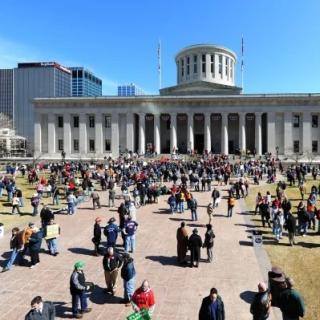Advertisement
Great Financial Crisis
On September 15, 2008, Lehman Brothers filed for bankruptcy. It was the largest bankruptcy in the history of the United States, a key moment of mounting panic during what came to be known as the Great Financial Crisis. In London this year, some of the alumni of the bankrupt bank are reportedly planning to hold a party to "celebrate" the anniversary of the bankruptcy. That pretty much sums up the attitude of the rich.
The rich have certainly much to celebrate. Just about all assets they own -- from stocks to real estate -- in many countries command higher prices than ever. For the rest of us, however, the crisis has never ended. Our real wages, in fact, are declining, lagging behind inflation. Our pensions and health care benefits are being cut. Our housing costs are soaring.
Housing Crisis Today
The declining real wages and the soaring housing costs are two sides of the same bad penny. As pro-labor economist Dean Baker points out, "[r]ising rents are becoming an evermore important factor in inflation," accounting for "almost 60 percent" of the reported inflation. The National Low Income Housing Coalition reports that, in Ohio, there are only 42 affordable rental units available for every 100 low-income tenant households, forcing 68 percent of them to spend over half their income on rent. The coalition estimates that a renter needs to earn at least $15 an hour to rent a basic two-bedroom apartment in Ohio but the average renter in this state currently earns only $12.87.
Organized Money vs. Organized Labor
The reason why the rich have recovered from the crisis, even while the rest of us are still deeply mired in it? Their crisis was solved at our expense. Let's admit it. The United States, in form, is democracy; but it is plutocracy in substance. According to the Center for Responsive Politics, "business interests dominate" in political donations, "with an overall advantage over organized labor of about 16-to-1." Is there any wonder that the US government spent incomparably more to bail out financial corporations than working-class families? The gap between the political power of organized money and that of organized labor, widening at least since the 1980s, is certain to increase after the right-wing success at stuffing the Supreme Court, culminating in Janus v. AFSCME.
Democracy
What if the United States became democracy in substance, not just in form? How would a democracy -- a true democratic government of the majority, by the majority, for the majority, in contrast to an oligarchy of the propertied few, by the propertied few, for the propertied few -- have responded to the Great Financial Crisis? How would a democracy tackle the housing crisis today?
A democracy facing a financial crisis of the magnitude seen in 2008 would not have merely used monetary policy to restore the profitability of financial corporations and reflate the prices of assets, leaving both securely in private hands. A democracy would have attempted to exercise democratic control over all the institutions that it bailed out, ousting their private directors whose failures had caused the crisis in the first place.
And a democracy facing a housing crisis would try to address a root cause of the crisis: the problem that shelters are commodities, for which we are forced to pay increasing shares of our incomes, and whose prices are subject to evermore volatile cycles of booms and busts. In a boom, houses become unaffordable for more and more people; in a bust, houses trap more and more people in mortgage debts larger than their home values. In other words, not only housing busts but housing booms, too, fail to meet our human needs for shelters. Therefore, a democracy would decommodify shelters, creating public housing fit for human habitation, for all who need it.
Public finance and public housing, both under democratic control. Isn't that "socialism?" No, not in and of themselves -- unless you think that the National Highway System, for instance, is also "socialism." The struggle to meet human needs that markets cannot meet, for housing or anything else, however, can make more and more people socialists. Poll after poll in the United States since the Great Financial Crisis has shown just that, and the latest Gallup poll is no exception: "For the first time in Gallup's measurement over the past decade, Democrats have a more positive image of socialism than they do of capitalism." Would the party leaders respond to the rank and file? Or would they continue to insist, like Nancy Pelosi and Elizabeth Warren, that the party is "capitalist" to its core?
As Frederick Douglass said, "Power concedes nothing without a demand. It never did and it never will." Inside and outside the Democratic



